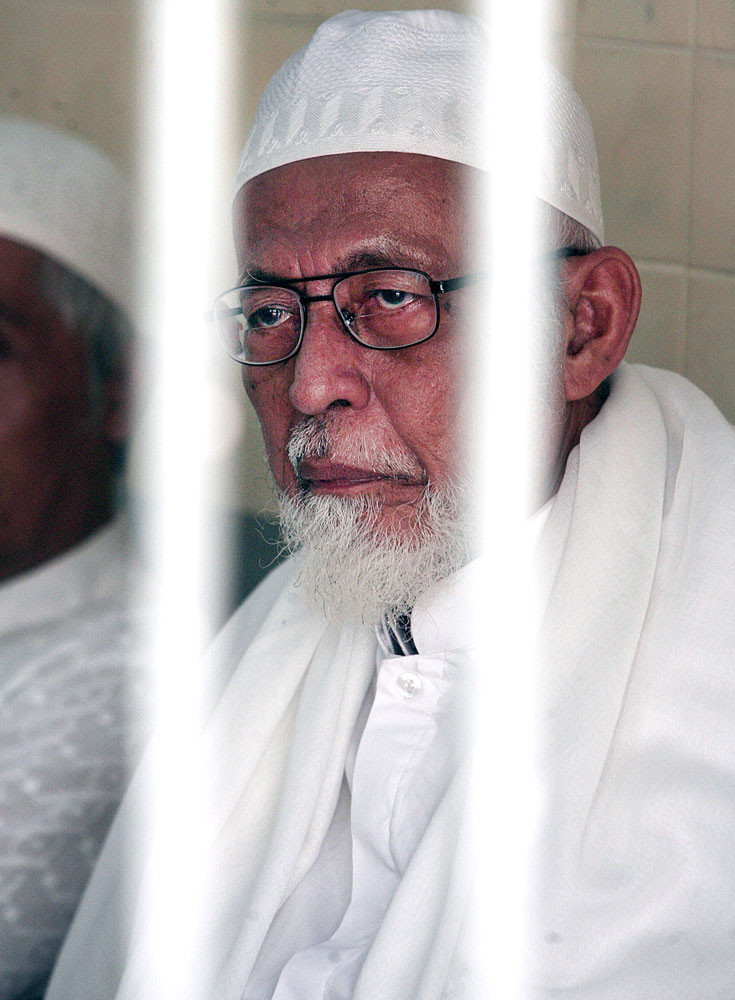Popular Reads
Top Results
Can't find what you're looking for?
View all search resultsPopular Reads
Top Results
Can't find what you're looking for?
View all search resultsQuestioning early release of Ba'asyir
Ideology doesn’t age the same way the body does; it never dies.
Change text size
Gift Premium Articles
to Anyone
P
resident Joko “Jokowi” Widodo has ordered the Law and Human Rights Ministry to prepare for the early release of Abu Bakar Ba’asyir for “humanitarian reasons”, taking into account his age and deteriorating health.
This decision has surprised many, considering Ba’asyir is notorious for his repeated involvement in terrorism and his endorsement of radical Islam. Significantly, the United Nations placed him on its list of international terrorists.
He is known to be the spiritual leader of Jamaah Islamiyah, which was responsible for several terrorist attacks and assassinations in Southeast Asia and is linked to other terrorist groups such as al-Qaeda and the Moro Islamic Liberation Front.
In Indonesia, Ba’asyir himself is well known as the mastermind of the 2002 Bali bombing, an attack so grave it attracted overwhelming international attention.
The attack not only killed and injured more than 400 people, it also destroyed the livelihoods of millions of Balinese as a result of travel bans and the deteriorating state of tourism there.
Ba’asyir was actually offered parole in 2018 on condition that he would declare loyalty to Pancasila and vow not to repeat his crimes, compulsory requirements for inmates convicted of terrorism charges according to the regulation.
Insisting on his innocence and his belief that Pancasila is against Islam, he refused the offer. In contradiction of the importance of those two requirements, a few months later he was offered this unconditional release based on compassion and humanitarian reasons.
Now the question is: Is his compassionate release really justifiable, considering the gravity of his crime and the repetitive nature of his actions and taking into account that over the years his support for radical Islam never faded?
Ba’asyir has openly refused to declare his allegiance to Pancasila and Indonesia and, in fact, in July 2014 he publicly declared his allegiance to Abu Bakr Al Baghdadi, the leader of the Islamic State movement, and his support for a caliphate.
Despite his notoriety for his repeated crimes, Ba’asyir had his sentence reduced.
In 2003, he was sentenced to three years in prison for immigration violations possibly related to terrorism, but the sentence was reduced to 20 months because of good behavior.
In October 2005, he was found guilty of involvement in the 2002 Bali bombing and was sentenced to two and half years of imprisonment, but this was eventually cut by four months and 15 days.
After his release in 2006 he pledged himself to a campaign to impose sharia. In October 2008, Ba’asyir also announced his intention to start Jamaah Ansharut Tauhid, a new Islamic group in Indonesia, which was later put in the United States terrorism list.
In December 2010, Ba’asyir was again arrested and charged with involvement in plans for terrorist actions and military training in Aceh.
He was convicted in June 2011 for supporting a terrorist training camp and was sentenced to 15 years in prison.
His repeated imprisonment does not represent good behavior or a promising future in which he would at least not pose a threat to the larger society. His persistence over the years only proves to us that his allegiance to radicalism has never died and the fact that he is currently more than 80 years old would not change that.
Ideology doesn’t age the same way the body does; it never dies.
Furthermore, if deteriorating health and old age are really the reasons, do more than 4,000 other elderly inmates aged 65 years and older in Indonesia stand the same chance? Are they also to receive early compassionate release, or are their cases to be forgotten because they are just anonymous, unknown inmates in the system?
Is it really fair to release one inmate who has such a long and dangerous track record, but to keep 4,000 others incarcerated, regardless of their health conditions and the fact that their days are also numbered?
The law is supposed to be fair and universal. Everyone is equal before the law, according to the Constitution.
While Ba’asyir is getting his early release, Meiliana, a woman from North Sumatra, is serving 18 months’ imprisonment for merely complaining to her neighbor that the adzan (call to prayers) from her local mosque was too loud.
Likewise, crosses are broken in graveyards, Ahmadi mosques and Buddhist viharas are burned to ashes and Javanese new year offerings are destroyed, but the President remains silent.
***
The writer is a public policy researcher based in Abu Dhabi.











